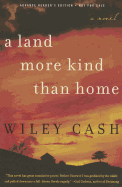Justice Department Sues; Three Publishers Settle
In a clash of concepts about what best serves the reader--the lowest possible prices or a healthy, diverse book industry--the federal government yesterday came down on the side of the book as a commodity. 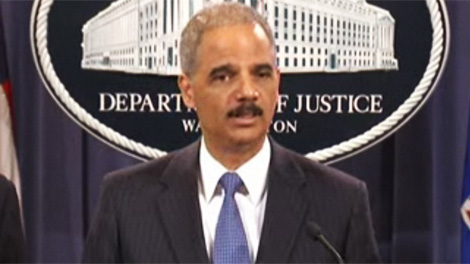 As expected, the Department of Justice officially filed a civil suit in district court in New York against Apple and five of the six major publishers, charging they "conspired to raise retail prices of e-books" by adopting agency pricing for e-books and applying it to all customers. As a result, Attorney General Eric Holder said at a news conference, the Department believed "consumers paid millions of dollars more for some of the most popular titles." While indicating they don't agree with the charges, three of the publishers--Hachette, HarperCollins and Simon & Schuster--are settling with the Department and accepting a range of limitations on how they can sell e-books. By contrast, Apple, Macmillan and Penguin are not settling.
As expected, the Department of Justice officially filed a civil suit in district court in New York against Apple and five of the six major publishers, charging they "conspired to raise retail prices of e-books" by adopting agency pricing for e-books and applying it to all customers. As a result, Attorney General Eric Holder said at a news conference, the Department believed "consumers paid millions of dollars more for some of the most popular titles." While indicating they don't agree with the charges, three of the publishers--Hachette, HarperCollins and Simon & Schuster--are settling with the Department and accepting a range of limitations on how they can sell e-books. By contrast, Apple, Macmillan and Penguin are not settling.
At the same time, attorneys general from 16 states, led by Texas and Connecticut, also filed a suit paralleling the federal suit, seeking monetary damages on behalf of consumers in their states who bought e-books. The states' suit was filed in federal court in Austin, Tex. Texas attorney general Greg Abbott said the suit estimated "overcharges" of more than $100 million. HarperCollins and Hachette are settling with the states.
And in Europe, Apple and all the publishers except for Penguin are ready to settle in the investigation brought by the European Commission that touches on some of the same issues as the U.S. case, the Bookseller reported. A representative of the EC indicated that the negotiations are continuing and that the Commission has benefited from a "very close and productive co-operation" with the Department of Justice.
The Justice Department's Argument
The gist of the Justice Department's case: "Beginning no later than September 2008, the Publisher Defendants' senior executives engaged in a series of meetings, telephone conversations and other communications in which they jointly acknowledged to each other the threat posed by Amazon's pricing strategy and the need to work collectively to end that strategy. By the end of the summer of 2009, the Publisher Defendants had agreed to act collectively to force up Amazon's retail prices and thereafter considered and implemented various means to accomplish that goal." It charged, too, that publishers "took steps to conceal their communications with one another, including instructions to 'double delete' e-mail and taking other measures to avoid leaving a paper trail."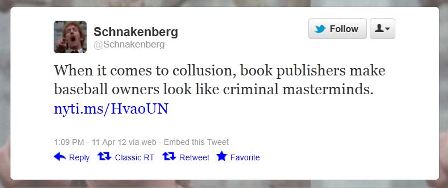
One example: "In September 2008, Penguin Group CEO John Makinson was joined by Macmillan CEO John Sargent and the CEOs of the other four large publishers at a dinner meeting in The Chefs Wine Cellar, a private room at Picholene [sic]. One of the CEOs reported that business matters were discussed." (The Justice Department mentioned Penguin and Macmillan executives at length and by name in the complaint while using anonymous reference for executives at companies that have settled with it.)
The Justice Department quoted extensively from e-mails in which publishing executives spoke of the situation in a general way: "We've always known that unless other publishers follow us, there's no chance of success in getting Amazon to change its pricing practices," one executive wrote. "Without a critical mass behind us Amazon won't 'negotiate,' so we need to be more confident of how our fellow publishers will react."
The conspiracy began with proposals for joint ventures involving the sale of e-books to consumers, the Justice Department said. "These ostensible joint ventures were not meant to enhance competition by bringing to market products or services that the publishers could not offer unilaterally, but rather were designed as anticompetitive measures to raise prices."
The talk then moved to using the agency model to bolster prices, and "Apple's entry into the e-book business provided a perfect opportunity for collective action to implement the agency model and use it to raise retail e-book prices."
In December 2009, an Apple executive in charge of e-book business met with the six major publishers individually. "Hachette and HarperCollins took the lead in working with Apple" and allegedly communicated with each other about the meetings, the Justice Department said. In further meetings, Apple proposed that all e-book retailers be required to sell via the agency model, sought a 30% "commission" under the agency plan and demanded an end to delayed publication of e-book versions of new books. During these negotiations, "Apple kept each Publisher Defendant informed of the status of its negotiations with the other Publisher Defendants" and publishers were repeatedly assured that other publishers were going along with the proposal.
In late January, over three days, the five publishers adopted the agency model, intended to go into effect with the April 3 launch of the iPad. Recounting the battle between Amazon and Macmillan over e-book pricing--when Amazon delisted all Macmillan titles--the Justice Department disapprovingly noted other publishers' support for Macmillan.
In a section that apparently refers to Random House, which initially did not adopt an agency model and was not sued by the Justice Department, the complaint alleged that the five publishers and Apple pressured it to adopt the agency model, too, and even wanted a major retailer--presumably Barnes & Noble or Borders--to "punish" it.
Terms of the Settlement
Under the federal settlement, which makes for mind-numbing reading, publishers will have no control for two years over how e-book retailers sell the e-books or offer discounts or other promotions on them, and for five years, publishers cannot offer "most favored nation" pricing, i.e., requiring that no other retailer will sell below that level. The Justice Department has some limits on below-cost pricing for retailers.
Despite the furor over supposed collusion involving the adoption of the agency model, the Justice Department has said it does not oppose the agency model itself. In fact, it will allow publishers to use the agency plan, but retailers can discount only up to the 30% that is their "commission" under the standard agency e-book model.
Already, Amazon has "plans to push down prices on e-books," the New York Times said. "The price of some major titles could fall to $9.99 or less from $14.99, saving voracious readers a bundle."
So, in the name of antitrust, the level playing field of the past two years--agency model e-books were priced the same whether sold by Amazon, Barnes & Noble or independent bookstores--will likely revert to a situation where a near-monopoly power determines pricing and most other retailers see their already-smaller market share shrink. Although Apple and the publishers may have cooperated in ways that violated the nation's sometimes contradictory antitrust laws, for the Justice Department to single this matter out and not address other issues in the book industry or in business in general seems misguided.
The Fine Print
The federal settlement has many very specific requirements, some of which appear exceedingly petty, punitive and a sizable waste of money, energy and time:
- The publishers must end their current agency plan agreements with Apple in seven days and effectively with other retailers in 30 days.
- Within 30 days, publishers must designate an "antitrust compliance officer" whose duties will include, among other things, giving a copy of the settlement to all company officers and directors and all employees engaged in the sale and distribution of e-books and ensuring that those people receive at least four hours of training annually "on the meaning and requirements of this final judgment and the antitrust laws" from an antitrust attorney; conducting an annual antitrust compliance audit covering all company officers and directors and all employees engaged in the sale and distribution of e-books; providing to the Justice Department quarterly a log of "all oral and written communications, excluding privileged or public communications," between the publisher and anyone at another settling publisher relating to "the distribution or sale in the United States of books sold in any format," including descriptions of the communications, "the date, time, and duration of the communications, the medium of the communication," ad nauseum; and an annual written statement addressing the publisher's compliance with the settlement agreement.
- Within 60 days, all company officers and directors and all employees engaged in the sale and distribution of e-books must certify that they have read, understood and will abide by the settlement and are not aware of any antitrust violations--with certifications repeated annually thereafter.
- Publishers must notify the Justice Department in writing at least 60 days in advance of "the formation or material modification of any joint venture or other business arrangement relating to the sale, development, or promotion of e-books in the United States" with other e-book publishers--and the Department specifies a series of questions to be answered. Within 30 days after that, the Department may ask for more information, in which case the publisher cannot proceed with the project for at least another. In a nice Orwellian touch, the Department said that if it doesn't ask for more information or challenge the project, that should not be considered approval.
- With "reasonable notice," the Justice Department or its representatives may "access" publishers' offices to inspect and copy or make publishers copy "all books, ledgers, accounts, records, data and documents" concerning the "any matters" relating to the settlement. They may also interview informally or on the record any publishers' employees.
- The Justice Department can force publishers to submit reports or respond to written interrogatories. In regard to the written reports, publishers might be required to conduct at their cost "an independent audit or analysis relating to any of the matters" in the settlement.
- Within a week of settlement, publishers have to give the Justice Department copies of all agreements made or renewed this year with any e-book retailer--and update the Department quarterly on other new or renewed agreements.
- Publishers can't "retaliate" against e-book retailers.
- Publishers can't conspire with any other e-book publishers to set e-book prices and can't share "any competitively sensitive information" about business plans or strategies, pricing, terms regarding book sales "in any format" or any author terms. (This even includes using e-retailers to convey information to other publishers.)
- The Justice Department exempted publishers' distributed lines from the restrictions as well as what appears to be publishers' participation in industry organizations and efforts. (The Department describes them this murky way: "output-enhancing industry standard-setting activities relating to e-book security or technology.")
- Unless granted an extension by the court, the settlement is in effect for five years.
Why HarperCollins and Hachette Are Settling
In statements, both HarperCollins and Hachette rejected the Justice Department's charges and indicated they are settling to avoid expensive legal battles against, as Hachette put it, "government plaintiffs with virtually unlimited resources."
Hachette said it settled "reluctantly" and "was not involved in a conspiracy to illegally fix the price of eBooks, and we have made no admission of liability." The company defended its adoption of the agency plan, which was "designed to facilitate entry by a new retail competitor and to increase the diversity and health of retail booksellers, and we took these actions knowing that Hachette itself would make less money than before the adoption of agency."
Hachette argued that the landscape for e-book sales had changed positively since the adoption of the agency model in 2010, writing, "Two years ago, Amazon effectively had a monopoly on the sale of eBooks and eReaders, and was selling products below cost in an effort to exclude competitors. Today consumers have multiple sources to choose from, and the price of dedicated e-readers has fallen dramatically. And the fact that 82% of Hachette's eBooks are currently priced at $9.99 or less--including many books by our bestselling authors--belies any notion that we increased prices on all eBooks."
Hachette called on the Justice Department and state attorneys general "to ensure that the market for eBooks remains diverse and competitive, and that we don't return to the days of monopoly, with one company controlling what and how people read eBooks."
For its part, HarperCollins said that it "did not violate any antitrust laws" and maintained that its "business terms and policies have been, and continue to be, designed to give readers the greatest choice of formats, features, value, platforms and partners--for both print and digital." Noting that it "faced legal challenges on five separate fronts," it said it "made a business decision to settle the DOJ investigation in order to end a potentially protracted legal battle."
HarperCollins argued that since it adopted the agency model in 2010, "the e-book market exploded, giving consumers more choices of devices, formats and prices that would never have existed but for the agency model." The company cited the launch of Apple's iBookstore and B&N's Nook Book Store; the reduction in e-reader prices; the introduction of "dynamic pricing of HarperCollins' e-books, including some titles priced under $2"; the introduction of color tablets and enhanced e-books.
John Sargent Speaks Out In a statement, Macmillan CEO John Sargent said that the company adopted the agency model for e-books "knowing we would make less money on our e book business. We made the change to support an open and competitive market for the future, and it worked. We still believe in that future and we still believe the agency model is the only way to get there."
In a statement, Macmillan CEO John Sargent said that the company adopted the agency model for e-books "knowing we would make less money on our e book business. We made the change to support an open and competitive market for the future, and it worked. We still believe in that future and we still believe the agency model is the only way to get there."
Macmillan had been in discussions with the Justice Department for months but decided not to settle because, Sargent said, "Macmillan did not act illegally. Macmillan did not collude." He called the Department's terms "too onerous," and said the terms "could have allowed Amazon to recover the monopoly position it had been building before our switch to the agency model. We also felt the settlement the DOJ wanted to impose would have a very negative and long term impact on those who sell books for a living, from the largest chain stores to the smallest independents."
He noted, too, that "the government's charge is that Macmillan's CEO colluded with other CEO's in changing to the agency model. I am Macmillan's CEO and I made the decision to move Macmillan to the agency model. After days of thought and worry, I made the decision on January 22, 2010 a little after 4 a.m., on an exercise bike in my basement. It remains the loneliest decision I have ever made, and I see no reason to go back on it now."
Sargent also quoted Scott Turow, president of the Author's Guild, who recently stated, "The irony of this bites hard: our government may be on the verge of killing real competition in order to save the appearance of competition. This would be tragic for all of us who value books and the culture they support."
Penguin Principles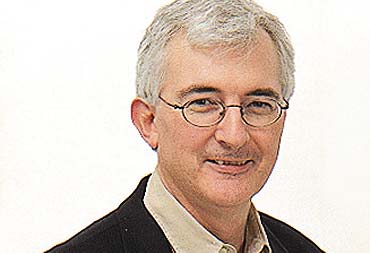 For his part, John Makinson, chairman and CEO of Penguin Group, issued a statement saying that Penguin has weighed its options carefully and has been so against settling that alone of all five publishers, it held no settlement discussions with the Justice Department. It decided not to settle for two reasons, he continued. For one, Penguin did "nothing wrong. The decisions that we took, many them of them costly and difficult, were taken by Penguin alone." Furthermore, the Justice Department suit "contains a number of material misstatements and omissions, which we look forward to having the opportunity to correct in court."
For his part, John Makinson, chairman and CEO of Penguin Group, issued a statement saying that Penguin has weighed its options carefully and has been so against settling that alone of all five publishers, it held no settlement discussions with the Justice Department. It decided not to settle for two reasons, he continued. For one, Penguin did "nothing wrong. The decisions that we took, many them of them costly and difficult, were taken by Penguin alone." Furthermore, the Justice Department suit "contains a number of material misstatements and omissions, which we look forward to having the opportunity to correct in court."
The second reason, Makinson said, was "we believed then, as we do now, that the agency model is the one that offers consumers the prospect of an open and competitive market for e-books. We understood that the shift to agency would be very costly to Penguin and its shareholders in the short-term, but we reasoned that the prevention of a monopoly in the supply of e-books had to be in the best interests, not just of Penguin, but of consumers, authors and booksellers as well.
"We are of course in the business of making money for our shareholders, but our purpose as a company is to make entertaining and intelligent books for readers of all ages and tastes. We shall not achieve either of those objectives in the absence of competition or choice. The decision we took in January 2010 to move Penguin's e-book business to agency pricing has been vindicated by the very rapid subsequent growth in the volume of e-books sold by agency publishers, and by the benefit to consumers of the steep decline in the price of e-book readers that that has resulted from this open competition."
Comments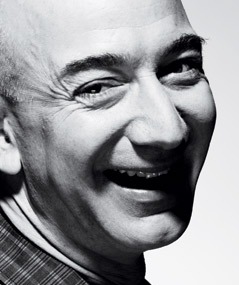 Of course, Amazon.com was happy with the settlement. In a statement, the company said, "This is a big win for Kindle owners, and we look forward to being allowed to lower prices on more Kindle books."
Of course, Amazon.com was happy with the settlement. In a statement, the company said, "This is a big win for Kindle owners, and we look forward to being allowed to lower prices on more Kindle books."
Incidentally, in a striking aside in the lawsuit, the Justice Department wrote, "From the time of its launch, Amazon's e-book distribution business has been consistently profitable, even when substantially discounting some newly released and bestselling titles." 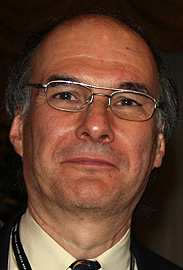 American Booksellers Association CEO Oren Teicher said, "Today's DOJ filing is baffling. Following the implementation of the agency model at the end of 2010, the e-book market has become more competitive. There is more--not less--competition among retailers, and more--not fewer--examples of marketing and promotional efforts among publishers that have reduced prices. For the Department of Justice to challenge a business model that played an essential role in fostering a more competitive, diverse retail environment seems to turn logic on its head and is not in the best interest of consumers. While it's not yet clear what the full implications are of the legal action announced today by the DOJ with regard to publishers' pricing models for e-books, we believe one fact is very clear: There is nothing inherently illegal about the agency model, and--as ABA has strongly said in the past--we believe that fostering a more competitive environment is in the long term best interests of readers and book buyers." --John Mutter
American Booksellers Association CEO Oren Teicher said, "Today's DOJ filing is baffling. Following the implementation of the agency model at the end of 2010, the e-book market has become more competitive. There is more--not less--competition among retailers, and more--not fewer--examples of marketing and promotional efforts among publishers that have reduced prices. For the Department of Justice to challenge a business model that played an essential role in fostering a more competitive, diverse retail environment seems to turn logic on its head and is not in the best interest of consumers. While it's not yet clear what the full implications are of the legal action announced today by the DOJ with regard to publishers' pricing models for e-books, we believe one fact is very clear: There is nothing inherently illegal about the agency model, and--as ABA has strongly said in the past--we believe that fostering a more competitive environment is in the long term best interests of readers and book buyers." --John Mutter






IPC.0204.S3.INDIEPRESSMONTHCONTEST.gif)





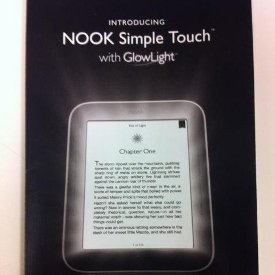 "B&N is beating Amazon to the punch," according to the Digital Reader, which reported that the upcoming
"B&N is beating Amazon to the punch," according to the Digital Reader, which reported that the upcoming 
 BookExpo show director
BookExpo show director IPC.0211.T4.INDIEPRESSMONTH.gif)
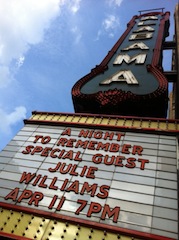 Last night at a special showing of A Night to Remember, the classic movie about the sinking of the Titanic, the Alabama Theatre in Birmingham invited author and historian Julie Williams to speak beforehand about her new book, A Rare Titanic Family: The Caldwells' Story of Survival (NewSouth Books), which recounts the story of Williams's great-uncle who survived the Titanic with his wife and son. Here is the theater's marquee greeting.
Last night at a special showing of A Night to Remember, the classic movie about the sinking of the Titanic, the Alabama Theatre in Birmingham invited author and historian Julie Williams to speak beforehand about her new book, A Rare Titanic Family: The Caldwells' Story of Survival (NewSouth Books), which recounts the story of Williams's great-uncle who survived the Titanic with his wife and son. Here is the theater's marquee greeting.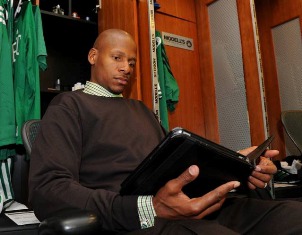 Boston Celtics guard Ray Allen
Boston Celtics guard Ray Allen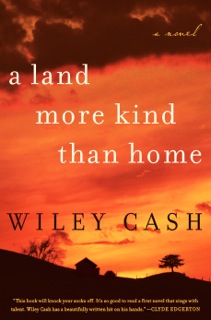 In his debut novel, A Land More Kind Than Home, Wiley Cash has written a superb story of good and evil in a small town in North Carolina. He's a natural storyteller, one who keeps the story moving forward but leaves readers well aware of how we arrived where we are. His penchant for detail never slows the narrative; it gives dimension to his characters, provides fully nuanced situations and makes it all eminently believable.
In his debut novel, A Land More Kind Than Home, Wiley Cash has written a superb story of good and evil in a small town in North Carolina. He's a natural storyteller, one who keeps the story moving forward but leaves readers well aware of how we arrived where we are. His penchant for detail never slows the narrative; it gives dimension to his characters, provides fully nuanced situations and makes it all eminently believable.